Israel Says Cruise Missile ‘from East’ Intercepted
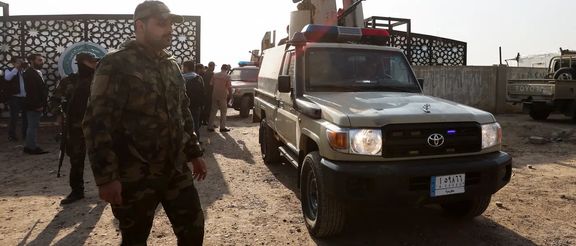
The Israel Defense Forces (IDF) reported intercepting a cruise missile originating “from the east” suggesting that the missile was launched from Iran-backed militias in Iraq.

The Israel Defense Forces (IDF) reported intercepting a cruise missile originating “from the east” suggesting that the missile was launched from Iran-backed militias in Iraq.
Historically, the army has referred to attacks coming from Iraq as originating "from the east."
The IDF also downed a "suspicious aerial target" that had crossed into Israeli airspace from Lebanon. The Iron Dome air defense system engaged the target shortly after alarms triggered in the northern town of Margaliot.
Earlier this month, a coalition of Iran-supported armed groups known as the Islamic Resistance in Iraq launched several cruise missile strikes towards Israel, according to Reuters which claimed that the strikes involved multiple Arqub-type cruise missiles and notably targeted the city of Tel Aviv for the first time.
The Islamic Resistance in Iraq has also been responsible for numerous rocket and drone attacks on US forces stationed in Iraq and Syria. Such attacks have been ongoing in the months following the outbreak of the Israel-Hamas conflict on October 7.
The militias, heavily supported by Tehran both logistically and financially, continue to engage in operations that threaten regional stability, demonstrating Iran's broader regional ambitions and its strategy of projecting power through proxy groups.
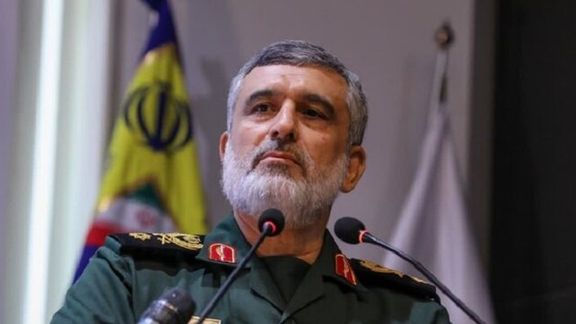
Commander Amir-Ali Hajizadeh of Iran's Revolutionary Guards Aerospace Force claims that Israel has offered concessions in Gaza to forestall Iranian retaliation even though Israel continues its relentless offensive on the Gaza Strip.
"Israel sent messages through Egypt's foreign minister that it will compromise in the war in Gaza to avoid Iran's retaliation," Amirali Hajizadeh said.
However, the claims, made through Iran's state media, seem unlikely as Israel has continued to deepen its operation into Rafah, Hamas's last stronghold in south Gaza, in spite of warnings from the International Criminal Court, as the Jewish state continues with its war aims to eliminate Hamas and return the remaining 125 hostages being held in Gaza.
In April, Iran initiated its first direct assault on Israeli soil with over 350 drones and missiles, a response to what Iran claimed was an Israeli attack on its consulate in Damascus, an incident resulting in the deaths of seven officers from the Islamic Revolutionary Guard Corps and a senior commander.
Although the majority of the projectiles were intercepted by Israel and a US-led coalition, Hajizadeh has claimed that Iran's strike nonetheless succeeded in "destroying" targeted Israeli military bases, while imagery from the Nevatim air base shows only limited damage.
Last month, Hajizadeh asserted that the aerial assault on Israel was executed using limited military capabilities, saying, "We had to use a great number of missiles and drones to get through Israel's Iron Dome, we used 20% of our military capability in the operation".
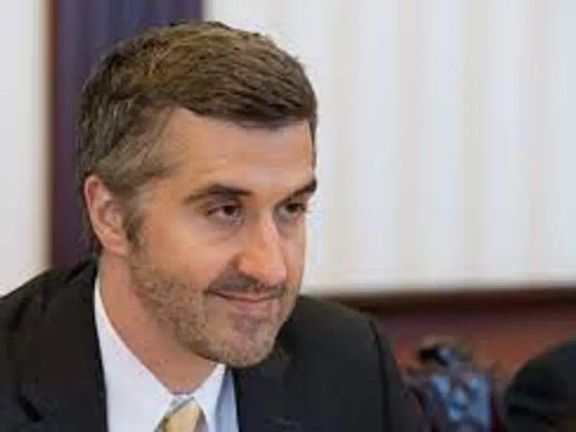
US Secretary of State, Antony Blinken, praised the work of US-Iranian Ramin Toloui, the Assistant Secretary for Economic and Business Affairs, leaving to pursue his career at Stanford University.
In a statement, Blinken said, "Ramin championed a guiding principle of our foreign policy: that economic security is national security."
According to the statement, throughout his service, Toloui was instrumental in implementing economic sanctions against Russia following its invasion of Ukraine, enhancing global food security, and addressing coercion by hostile international actors.
Blinken expressed deep appreciation for Toloui's "exceptional service," commending his leadership in engaging with the G20 and advancing partnerships with US businesses and workers.
Born and raised in Iowa City, Iowa, Toloui has an extensive background in both academia and the financial sector, having previously held positions at PIMCO and the Department of the Treasury before his appointment at the State Department.
Iranian-Americans, an integral part of the United States’ cultural fabric, have assumed critical roles across various sectors of American society, the biggest expatriate community of Iranians globally.
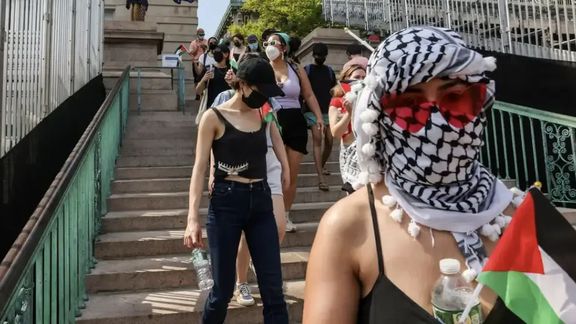
Iran's supreme leader has praised the pro-Palestine students, branding them part of Iran's 'resistance front' against the US and Israel.
“Dear university students in the United States of America, you are standing on the right side of history. You have now formed a branch of the Resistance Front and have begun an honorable struggle in the face of your government's ruthless pressure - which openly supports Zionists,” read a letter by Ali Khamenei.
The letter, dated May 25 and published on Khamenei's website on Thursday, predicts a "different fate awaits the important region of West Asia,” branding the students part of the “resistance front”, the group of militias Iran sponsors across the Middle East.
“The ‘resistance front,” the letter added, “rose amid this dark and bleak atmosphere, and the formation of ‘the Islamic Republic’ in Iran contributed to its expansion and strength.”
Thousands of students have taken to the streets and set up encampments at their campuses to protest against Israel which is in the midst of a war against Iran-backed Hamas in Gaza. Sparked by the Hamas invasion of October 7, in which 1,200 mostly civilians were killed, the retaliation has seen over 35,000 Palestinians killed according to Hamas. It has seen Israel accused of genocide as it continues its war aimed at annihilating Hamas and rescuing the remaining 125 hostages in Gaza. The US has defended Israel’s right to defend itself and continues to arm the world’s only Jewish state.
Khamenei added that the US administration had been providing the regime with continual political, economic, and arms support. “The American administration and its partners have not even as much as frowned upon this state terrorism and incessant oppression,” the letter read.
The letter sparked responses from across the political spectrum. US House Speaker Mike Johnson said: "When you’ve won the Ayatollah, you’ve lost America.”
Pro-Palestinian student protests in the US have been providing media fodder for the Islamic Republic as it continues to bet on political trouble overseas to make up for lost legitimacy at home.
Khamenei and his loyalists in the Iranian regime have seen victory in pro-Hamas protests in American universities, and the Supreme Leader on several occasions made sure to highlight this.
“Despite the extensive efforts of Zionists and their American and European supporters, the issue of Gaza remains the top global concern. Protests against the crimes of the Zionist regime in American universities and their expansion to European universities are signs of the continued sensitivity of public opinion worldwide to the Gaza issue,” Iran’s ruler said earlier in May.
A pro-government ideologue has expressed hope that the Islamic Republic can use the potential of pro-Palestinian protesting students at US campuses to form a new proxy group in America.
“I think the potential to repeat in the US what the Islamic Republic did in Lebanon is much higher. Our Hezbollah-style base in the US is much larger than what we have in Lebanon,” said University of Tehran professor Foad Izadi in an interview with Iran’s state TV in early May.
Khamenei has invested 35 years of his rule to relentlessly campaign against Israel, the United States and Western influence, not only in the Middle East but also in distant places in Africa and Latin America.
With heavy political and military investment on Hamas and other militant groups in the region, Khamenei seems desperate to showcase any sign of anti-Israeli and anti-Western public opinion at home and abroad as a sign of vindication for his worldview.
“The brutal and merciless behavior of the rabid Zionist dog proved the righteousness of the Islamic Republic's position and the Iranian people, and the massacre of thirty-some thousand people, half of whom are women and children, demonstrated the evil nature of the Zionist regime and the perpetual righteousness of Iran to the whole world,” according to Khamenei.
While Khamenei praises the protesters, Iran continues to quash dissent with hundreds of Iranians killed since 2022’s Women, Life, Freedom uprising and tens of thousands imprisoned.
Khamenei feels insecure after years of anti-regime protests by ordinary Iranians, whose social freedoms are being curtailed by Islamic restrictions and their economic status degraded by high inflation and lack of real jobs.
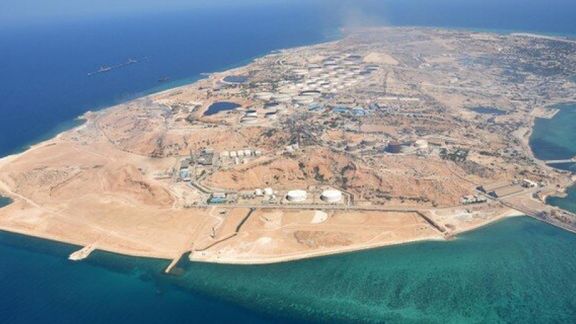
China may not support the territorial claims by the United Arab Emirates against Iran during a conference underway with Arab states in Beijing, Iran International has learned.
The UAE has laid claim to three small islands in the Persian Gulf that Iran took control of in 1971 after the United Kingdom withdrew from the Persian Gulf and the UAE was formed. Other Arab states formally support the territorial claim.
The China-Arab States Cooperation Forum opened in Beijing on Thursday with President XI Jinping speech. The Forum was established in 2004 as a formal dialogue mechanism between China and Arab states. China is seeking to strengthen its relations with Arab states as a model for maintaining world peace and stability, Xi was quoted as saying by state media at the gathering.
The summit is attended by heads of state from Egypt, the United Arab Emirates, Bahrain and Tunisia among others.
A diplomatic source close to the UAE-China negotiations told Iran International that Beijing has decided not to support the UAE's claim of ownership over the islands of Abu Musa, Greater Tunb, and Lesser Tunb at this meeting.
In exchange for this action, the Islamic Republic has promised to disrupt the development of the "International North-South Transport Corridor" (INSTC) project to slow down its progress.
The International North-South Transport Corridor is a strategic Russian-Indian-Iranian project that aims to connect the Caspian Sea to the Persian Gulf and the Indian Ocean.
This project was launched in 2000 with an agreement between Moscow, Tehran, and New Delhi in Saint Petersburg, and subsequently, 11 other countries, including Azerbaijan, Armenia, Kazakhstan, Kyrgyzstan, Tajikistan, Turkey, Oman, Ukraine, and Belarus, joined. Bulgaria is also participating as an observer.
The International North-South Transport Corridor is considered a competitor to China’s “Belt and Road Initiative.”
The Belt and Road Initiative is a plan presented by China's President in 2013 to enhance economic cooperation between China and the international community. Based on the "Silk Road," this initiative plays a key role in Beijing's foreign policy.
On the other hand, the International North-South Transport Corridor is of great importance to Moscow. However, progress on this project has been delayed due to increasing pressure from Beijing on Tehran.
According to information received by Iran International, on the eve of the Arab-Chinese meeting, Beijing sent confidential messages to Tehran, stating that it is willing to refrain from recognizing the UAE's position on the sovereignty of the three islands in exchange for disruptions in the development of the North-South Corridor project.
Based on this information, China expects the Islamic Republic to take practical steps, such as interfering with the planning of the Iranian section of the North-South Corridor and delaying the financing of the project to postpone its implementation.
Last July, Russia sided with the UAE on the issue of the three islands, signing a communique in a conference with the Gulf Cooperation Council, comprising six Arab states. Iran protested Moscow’s move but has remained dependent on its alliance with Russia.
In the joint statement from the Russia-Arab countries meeting held on December 20, 2023, in Morocco, Russia once again supported Abu Dhabi's position on the three islands of Greater Tunb, Lesser Tunb, and Abu Musa was once again supported.
Sergey Lavrov, Russia's Foreign Minister, represented Moscow at this meeting.
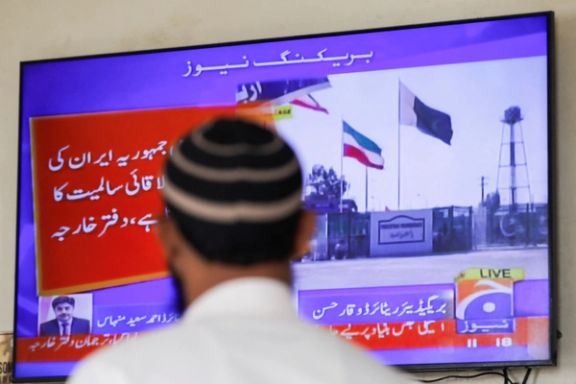
Four Pakistanis were killed and two were injured late on Tuesday night, when Iranian forces opened fire in the restive southwestern province of Balochistan in Pakistan, Reuters reported.
The shooting took place near the Pakistan-Iran border, in Washuk District, confirmed Umar Jamali, additional deputy commissioner.
Naeem Umrani, deputy commissioner Washuk, said an investigation is being initiated to determine the reason for the shooting.
Former Iranian President Ebrahim Raisi visited Pakistan in April on a three-day official visit as the two Muslim neighbours seek to mend ties after unprecedented tit-for-tat military strikes this year. Raisi's visit was seen as a key step towards normalising ties with Islamabad.
Iran and Pakistan have had a history of rocky relations, but missile strikes in January were the most serious incidents in years, with Pakistan recalling its ambassador to Tehran and not allowing his counterpart to return to Islamabad, as well as cancelling all high-level diplomatic and trade engagements.
Swift efforts to lower the temperature subsequently led to assurances that they respected each other's sovereignty and territorial integrity, as well as vows to expand security cooperation and requests for envoys to return to their posts.
Islamabad said it hit bases of the separatist Baloch Liberation Front and Baloch Liberation Army, while Tehran said it struck militants from the Jaish al-Adl (JAA) group.
The militant groups operate in an area that includes Pakistan's southwestern province of Balochistan and Iran's southeastern Sistan-Baluchestan province. Both regions are restive, mineral-rich and largely underdeveloped.
(Report by Reuters)